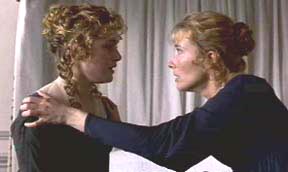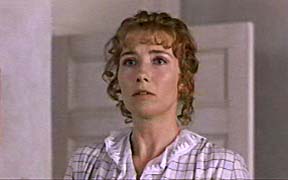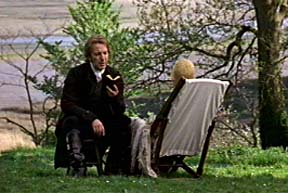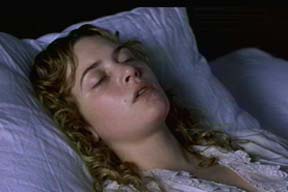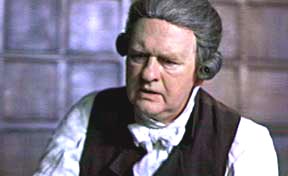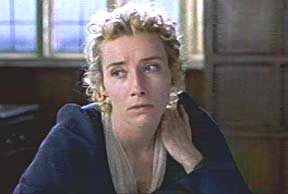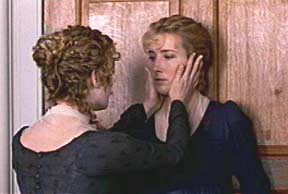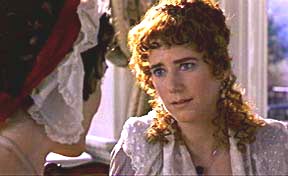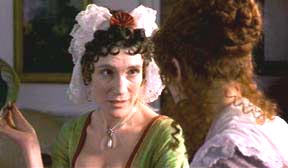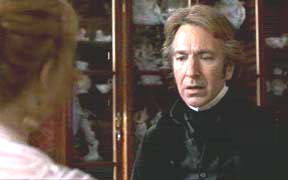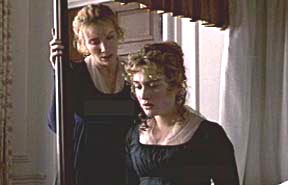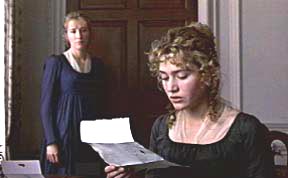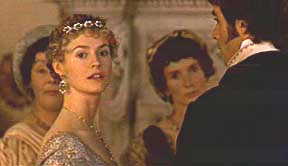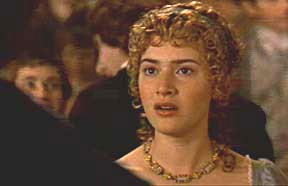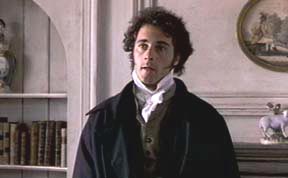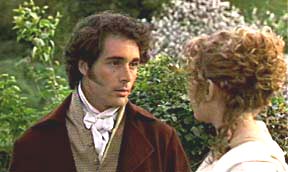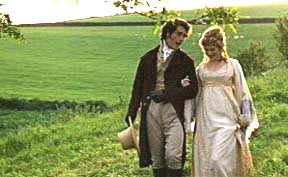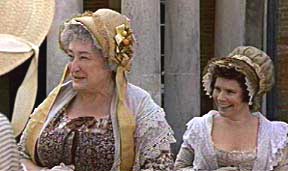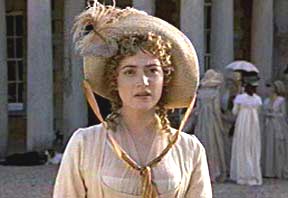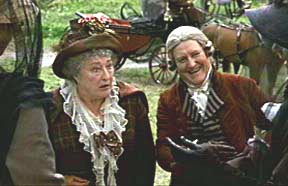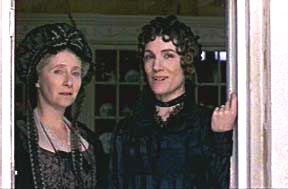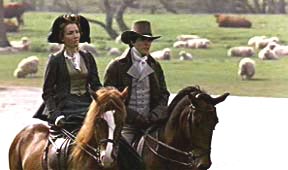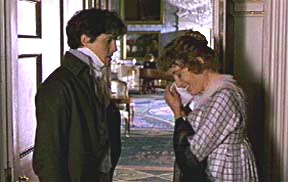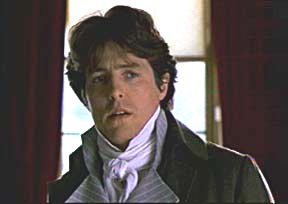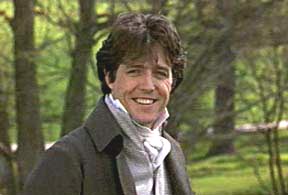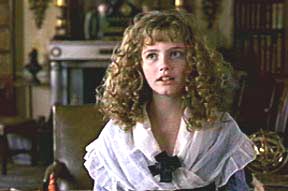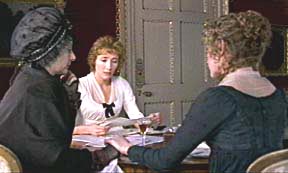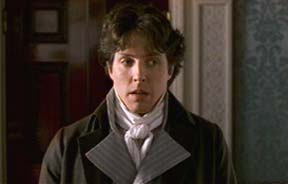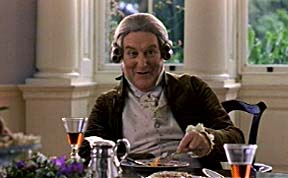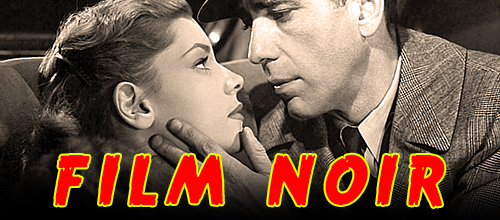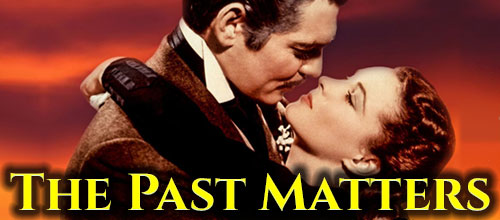
Another Jane Austen adaptation, “Sense & Sensibility” is a 19th century Romantic comedy which features three young sisters in their quest for love. When English country gentleman, Mr. Dashwood, dies, his second wife and their three daughters are left with little to live on, and nothing for their dowries, which sorely tests their relationships with suitors that they deeply care about. Hoping to marry and ensure economic security, the sisters undergo wily adventures to make themselves the next Mrs. Right for those potential suitors that come their way.
Directed by Ang Lee.
The screenplay was written by Emma Thompson, based on Jane Austin’s novel.
The cast includes: Emma Thompson, Alan Rickman, Kate Winslet, Hugh Grant, Gemma Jones, Tom Wilkinson, Greg Wise, Robert Hardy, Harriet Walter, James Fleet, and Emilie Francois.
Tagline: “Lose your heart and come to your senses.”
SENSE & SENSIBILITY was nominated for the Best Picture award.
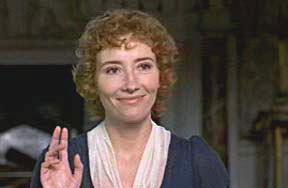 This story begins, showing a dying gentleman, Mr. Dashwood (Tom Wilkinson), on his deathbed, talking with his son, John (James Fleet). Because of English law, Dashwood’s whole Norland Estate must be given to John, with only 500 pounds a year designated for his second family. Looking his son squarely in the eye, the elderly Mr. Dashwood firmly lets John know his wishes for part of his estate to go to his second wife (Gemma Jones) and his daughters, strongly imploring him and making him promise to financially take care of his step-mother and his three step-sisters, which includes providing dowries for their future marriages. While young John Dashwood earnestly promises his father he will do so, he later shows himself to be an arrogant, selfish, gutless wonder, by agreeing with his wife’s rationalizations to do the opposite. John’s heartless, selfish wife, Fanny (Harriet Walter), easily persuades him into only giving them 20 pounds on occasion, providing them no house to live in, and no dowries for the future.
This story begins, showing a dying gentleman, Mr. Dashwood (Tom Wilkinson), on his deathbed, talking with his son, John (James Fleet). Because of English law, Dashwood’s whole Norland Estate must be given to John, with only 500 pounds a year designated for his second family. Looking his son squarely in the eye, the elderly Mr. Dashwood firmly lets John know his wishes for part of his estate to go to his second wife (Gemma Jones) and his daughters, strongly imploring him and making him promise to financially take care of his step-mother and his three step-sisters, which includes providing dowries for their future marriages. While young John Dashwood earnestly promises his father he will do so, he later shows himself to be an arrogant, selfish, gutless wonder, by agreeing with his wife’s rationalizations to do the opposite. John’s heartless, selfish wife, Fanny (Harriet Walter), easily persuades him into only giving them 20 pounds on occasion, providing them no house to live in, and no dowries for the future.
John and Fanny move into what is now their Norland Mansion with Mrs. Dashwood (Gemma Jones) and her daughters, Elinor (Emma Thompson), Marianne (Kate Winslet), and young Margaret (Emilie Francois), who can stay temporarily until they find a home to rent. Elinor is the strong, practical one who makes the hard decisions as her mother and Marianne aren’t taking this at all well. During this time, Fanny’s kind, warm brother Edward Ferrars (Hugh Grant) comes to visit. The amiable, kind Edward endears himself to the Dashwood women by his thoughtfulness, his kindness and his sense of humor. Elinor and Edward are soon attracted to each other, but their blooming, deep friendship is abruptly stopped when he is suddenly called home by the tyrannical Mother Ferrars, who demands absolute obedience from her children, or will cut them completely off without a penny. This pairing between Elinor and Edward is not approved of by Fanny or her family, because Elinor has no money, and they want Edward to marry someone with social status and money, as the family has great plans for Edward’s future, though Edward really wants to be a pastor in the countryside.
Fanny unkindly and snidely tells Mrs. Dashwood: “Edward is the compassionate sort of man, the kind that is preyed upon by penniless women.”
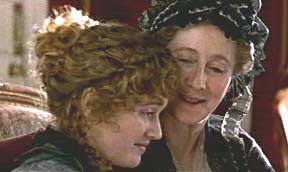 Luckily for Mrs. Dashwood, and her three daughters, Mrs. Dashwood’s cousin, Sir John Middleton invites them to come and stay in the small, three story Barton Cottage, located on his estate, Barton Park. So, with two servants, Thomas and Betsy, they all pack up and travel to Barton Park. Sir John Middleton (Robert Hardy) and his mother-in-law, Mrs. Jennings (Elizabeth Spriggs) come to enthusiastically greet them, making them feel wanted and at home. Sir John and his mother-in-law are very different people, being folksy and earthy, who love to tease and joke. Dashwood women were not used to being with these personality types, and must learn to adapt.
Luckily for Mrs. Dashwood, and her three daughters, Mrs. Dashwood’s cousin, Sir John Middleton invites them to come and stay in the small, three story Barton Cottage, located on his estate, Barton Park. So, with two servants, Thomas and Betsy, they all pack up and travel to Barton Park. Sir John Middleton (Robert Hardy) and his mother-in-law, Mrs. Jennings (Elizabeth Spriggs) come to enthusiastically greet them, making them feel wanted and at home. Sir John and his mother-in-law are very different people, being folksy and earthy, who love to tease and joke. Dashwood women were not used to being with these personality types, and must learn to adapt.
It doesn’t take long for two country gentlemen to become interested in young Marianne, who loves poetry, and is an accomplished pianist. She is described as being full of “aerial sensibilities and romantic notions.” Both the gentlemanly, noble, upright Colonel Brandon (Alan Rickman) and young, dashing, full of fun, spontaneous John Wiloughby (Greg Wise) begin to court young Marianne, with John capturing her heart totally – hook, line and sinker. Things look very promising in the marriage arena, as John and Marianne care for each other, and John asks to see her alone. Instead of proposing to her as all of the Dashwood women thought, he comes to her on the day he asked to see her alone, looking very guilty, and abruptly says he has to leave, giving no explanation. Marianne is crushed, but refuses to give up on him, pining away.
At a family get together at Barton Park Mansion, that included Mrs. Jennings’ daughter, Charlotte (Imelda Staunton) and her husband, Mr. Palmer (Hugh Laurie), Elinor meets the insincere, not too bright Lucy Steele (Imagen Stubbs), a niece of a schoolmaster, who confides to Elinor that she and Edward Ferrars had been secretly engaged for five years, and was scared about his family finding out. Elinor puts two and two together and surmises that this was what Edward was trying to tell her in the stable before he was abruptly sent away by Fanny. There are now two strikes against her yearnings, her love for Edward. The now tormented, heart-sick Elinor, being the self-disciplined, practical person she was, inwardly grieves but doesn’t tell anyone, not even Marianne, because she had promised Lucy she would keep the secret about the engagement.
Things come to a head when Mrs. Jennings decides to take Elinor, Marianne, and Lucy to London to introduce them into society, in hopes of finding them husbands. Once there, Marianne feverishly sends notes to Wiloughby, and gets even more upset when he ignores them. Finally, at a big, grand party, Marianne sees Wiloughby with his bride to be and her family. Wiloughby totally and publicly rejects her, sending her into inconsolable mourning. It was a moment of “English, upper-class snobbery.” It seems that Wiloughby has a dastardly secret or two, and needed to marry a woman with money. Marianne becomes deathly ill, which is upsetting to all who love her, especially Elinor and Colonel Brandon.
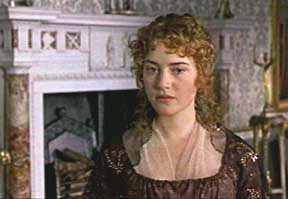 The following twists and turns and heart rendering moments that come next in the screenplay build and keep the audience guessing as to what is going to happen next, keeping the audience involved in this most enjoyable screenplay. Will Marianne survive her illness? Who will end up marrying who? How will this story end on a happy, romantic note, despite all the problems and situations presented? Will Fanny and John get their just comeuppance?
The following twists and turns and heart rendering moments that come next in the screenplay build and keep the audience guessing as to what is going to happen next, keeping the audience involved in this most enjoyable screenplay. Will Marianne survive her illness? Who will end up marrying who? How will this story end on a happy, romantic note, despite all the problems and situations presented? Will Fanny and John get their just comeuppance?
Based on Jane Austin’s novel, this marvelous screenplay was written by Emma Thompson, which earned Thompson the Oscar for Best Screenplay based on another source. She is as talented a writer as she is an actress, as the film flows wonderfully. Jane Austin would be very pleased with her effort. Emma omitted some parts of the novel, and added some other scenes, as she adapted the novel for the film. She fully captures the wit, charm, human heartlessness, as well as human kindness and caring in her debut masterpiece that Jane Austin wanted to get across in her novel. By the end of the story, the characters bring home the point that a balanced mixture of sense and sensibility is the best plan.
Director Ang Lee did a terrific job directing and putting together this wonderful film. I especially like the way he worked with the marvelous cast, with everyone portraying their character perfectly. He also directed the much acclaimed “Crouching Tiger, Hidden Dragon.” He understands period pieces very well, and brings the story to life, directing the cast appropriately for the times that their characters live in.
What a dream cast!
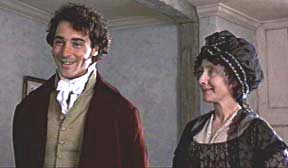 Emma Thompson uses her great talent as an actress to show the many sides of Elinor. She expertly and creatively shows the changes Elinor goes through after experiencing the various trials and challenges that confront her along the way, as she finds it harder and harder to be all senseâ and not show her emotions.
Emma Thompson uses her great talent as an actress to show the many sides of Elinor. She expertly and creatively shows the changes Elinor goes through after experiencing the various trials and challenges that confront her along the way, as she finds it harder and harder to be all senseâ and not show her emotions.
Alan Rickman was convincing as the noble, brave, kind Colonel Brandon, who deeply loves Marianne, but doesn’t stand in the way of the ill-fated love of Marianne and Wiloughby, because Marianne was so happy. He steps up to the plate when Marianne and Elinor need his help. His facial expressions and delivery of his lines proves that Rickman is a talented, gifted actor, who plays both heroes and villains equally well. A favorite scene that shows Brandon’s true character happens after Wiloughby rejects Marianne at the ball. He comes to Elinor, and tells her the whole sordid story of why Wiloughby had married Ms. Grey, and willingly forgot about his love for Marianne. But despite telling about the true character of Wiloughby as being the “worst of Libertines,” he also tells Elinor, that he had found out from another reliable source that Wiloughby had truly loved Marianne, and was planning to ask her to marry him, until his ugly doings had come to light.
Kate Winslet gave an outstanding performance in her portrayal of Marianne Dashwood, who loves poetry, loves music and believes in both living and showing her feelings. Winslet earned a normination for Best Supporting Actress. Marianne desires an idealistic romantic love, that burns in intensity. Heart and feelings overrule the questions and common sense of the mind. When Wiloughby rescues her and brings her home, and she discovers that he also knows by heart the Sonnets she adores, she falls head over heels in love, ignoring the questions of sensible Elinor.
My favorite scene with Marianne and Elinor takes place the following morning after the rejection at the ball, when Marianne finally gets an answer from Wiloughby in the form of a dear john letter. When she still tries to defend Wiloughby, Elinor tells her the truth that Wiloughby had had the rest of them believing that he loved her and wanted to marry her. Marianne suffers a total emotional melt down.
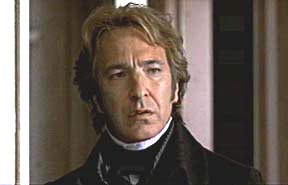 Hugh Grant is charming as the bashful, good-hearted, honorable Edward Ferrars who must decide at some point between towing the family line or doing what is honorable, and best for him in the long run.
Hugh Grant is charming as the bashful, good-hearted, honorable Edward Ferrars who must decide at some point between towing the family line or doing what is honorable, and best for him in the long run.
My favorite scene between Edward, Elinor and Margaret takes place in the Norwood library before the Dashwood women move to Barton cottage. Young Margaret had been hiding from them all, since her father had died. Edward discovers where she is, and tells Elinor. He and Elinor fabricate a conversation with a straight face about where the Nile is located. Margaret is a geography enthusiast and is compelled to come out of hiding and set them straight.
Greg Wise gives a convincing performance as the romantically exciting, witty John Wiloughby, with a few huge character flaws that make him unsuitable as a marriage prospect, from a practical point of view.
Elizabeth Spriggs had a wonderful time portraying the very shrewdly observant Mrs. Jennings, who thinks it is her mission in life to help the unmarried women find appropriate husbands, while having a lot of fun along the way. She prides herself on her ability to “winkle” secrets out of people.
Robert Hardy also has fun in his role portraying Sir John Middleton, a fun-loving man who enjoys Mrs. Jennings efforts at zestful wrinkling and gladly steps in to be a father figure for young Margaret.
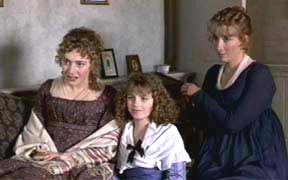 A favorite sequence of scenes between Mrs. Jennings, Sir John Middleton and the Dashwood ladies happens when they come to Barton Park for a meal for the first time. Mrs. Jennings makes the observation that Colonel Brandon, who was scheduled to arrive to meet them would make a fine match for Marianne, as by looking at Elinor’s face, she could tell that Elinor had left her heart back at Norland. With the help of the young Margaret, much to the annoyance and dismay of her mother and sisters, Mrs. Jennings finds out about “Mr. F.” Though Elinor is rescued from this uncomfortable situation by a quick-thinking Marianne, Mrs. Jennings periodically teases Elinor about “Mr. F.” through out the first part of the film.
A favorite sequence of scenes between Mrs. Jennings, Sir John Middleton and the Dashwood ladies happens when they come to Barton Park for a meal for the first time. Mrs. Jennings makes the observation that Colonel Brandon, who was scheduled to arrive to meet them would make a fine match for Marianne, as by looking at Elinor’s face, she could tell that Elinor had left her heart back at Norland. With the help of the young Margaret, much to the annoyance and dismay of her mother and sisters, Mrs. Jennings finds out about “Mr. F.” Though Elinor is rescued from this uncomfortable situation by a quick-thinking Marianne, Mrs. Jennings periodically teases Elinor about “Mr. F.” through out the first part of the film.
I thoroughly enjoyed the villainous performance of Harriet Walter, who did an inspiring job portraying the haughty, unkind Fanny Dashwood, the wife of the step brother, John Dashwood, who even discourages the luke- warm John from offering emotional help to the distraught Marianne and her upset family right after the disaster at the ball. Fanny, John and the younger brother of Fanny, Robert instead sit around at tea time and discuss Ms. Grey’s 50,000 pound dowry, and how penniless Marianne will eventually “loose her bloom,” and be a spinster, like Elinor. Lovely people!
A classic scene that takes place between Lucy Steele and Fanny Dashwood, is when Lucy foolishly tells her secret to Fanny. It is a favorite in that it shows the true character of Fanny, who looses control completely, after saying to Lucy that any family would accept her because of her special qualities, despite having no dowry.
The inspiring, absolutely beautiful musical score, written by the talented Patrick Doyle won the Oscar. Doyle also composed the music for “Bridget Jones’s Diary,” and “Gosford Park.”
“Sense and Sensibility” is rated P.G. While there is no sex or violence, some of the powerful scenes with Marianne in such emotional pain or battling her illness may be too much for sensitive children. Some say that this film is a screaming chick flick, but if you enjoy Jane Austin, and a gripping romantic story with a little humor, you will enjoy this film, whether you are a male or female.
If you enjoyed SENSE AND SENSIBILITY, you may like EMMA, MANSFIELD PARK, PERSUASION, EVER AFTER, GOSFORD PARK, and/or SHAKESPEARE IN LOVE.
Quotes said by Marianne:
“To die for love. What could be more glorious?”
“Always resignation and acceptance. Always prudence and dignity and honor. Elinor, where is your heart?”

